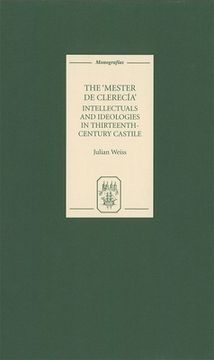the mester de clerecia: intellectuals and ideologies in thirteenth-century castile (in English)
Synopsis "the mester de clerecia: intellectuals and ideologies in thirteenth-century castile (in English)"
A fresh approach to the mester de clerecía, a group of narrative poems (epics, hagiography, romances) composed in thirteenth-century Spain by university-trained clerics for the edification and entertainment of the predominantly illiterate laity. In the thirteenth century, profound changes in Spanish society drove the invention of fresh poetic forms by the new clerical class. The term mester de clerecía (clerical ministry or service) applies to a group of narrativepoems (epics, hagiography, romances) composed by university-trained clerics for the edification and entertainment of the predominantly illiterate laity. These clerics, like Gonzalo de Berceo, understood themselves as cultural intermediaries, transmitting wisdom and values from the past; at the same time, they were deeply involved in some of the most contentious and far-reaching changes in lay piety, and in economic and social structures. The author challenges the predominantly didactic approach to the verse, in an attempt to historicize the category of the intellectual, as someone caught in the duality of the worlds of contingency and absolute values. The book will have a broad appeal to medievalists, in part because of the topics covered (feudalism, gender, nationhood, and religion), in part because many poems are either adaptations from French and Latin or have counterparts in other literatures (e.g., the romances or Alexander and Apollonius, the miracles of the Virgin Mary). JULIAN WEISS is Professor of Medieval and Early Modern Spanish at King's College London.

